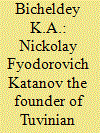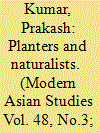| Srl | Item |
| 1 |
ID:
129196


|
|
|
|
|
| Publication |
2014.
|
| Summary/Abstract |
Indigenous peoples have been marred for centuries by the incredulous theft of knowledge they obtained, and even resources they use. The thieves are superior, more developed powers that jealously protect the rights to knowledge that is not rightfully theirs. They then refuse to recognize that the true ownership of such precious information belongs to Native Peoples. Indigenous knowledge is stolen without the slightest consideration to the powerful implications that it comes equipped with. The moral repercussions behind such an unethical system leads to loss of Native culture and sustainability and a shift from using Native knowledge and resources for social needs to profit generation. These problems are exacerbated by the use of Intellectual Property Rights (IPR), and the situation has delved to the point where nations bypass indigenous consent and wrongfully patent their knowledge and resources.
Why Indigenous Knowledge Is So Important
Knowledge of the natural world is not limited to science. Peoples spanning across the world have developed, over many years, a set of culturally rich knowledge systems that have been a result of the environments that they live in. Indigenous knowledge revolves around the environment and is of a largely ecological type. It is also referred to, by the World Bank, as the "traditional knowledge of the uses of plants" and even "ethnobotany."
|
|
|
|
|
|
|
|
|
|
|
|
|
|
|
|
| 2 |
ID:
128490


|
|
|
|
|
| Publication |
2013.
|
| Summary/Abstract |
Tuvinian studies is a comparatively new branch in Russian science and represents a set of scientific actions of collective and individual character. In a broader meaning it is a knowledge system about Tuva and the
Tuvinians. Its formation, further development and expansion are connected with the activity of Imperial Russian Geographic Society (IRGS) in the investigation and study of Central Asia in the second half of nineteenth and early twentieth century. The period from 1842 till 1945 can be conditionally called as "the
golden age" of Tuvinian studies. Undoubtedly it was preceded by a range of Tuvinian studies / researches in sixteenth to nineteenth centuries. In this period of history Russian empire strengthened the spread of its
geopolitical interests in Central Asia. Independent explorers and entire expeditions from Russia went to Mongolia, China and Tibet for different purposes including scientific ones. Frequently their pathway ran through the Uryankhai region (one of the former names of Tuva at that time), so explorers and researchers included Uryankhai (Tuva) in the plans of their investigations. Eventually general interest of the Russian empire and its scientific society in Central Asia led to the execution also of special investigations about Tuva.
|
|
|
|
|
|
|
|
|
|
|
|
|
|
|
|
| 3 |
ID:
131806


|
|
|
|
|
| Publication |
2014.
|
| Summary/Abstract |
The knowledge of indigo culture that developed on indigo plantations in colonial Bengal was remarkably cosmopolitan in its borrowings. The protean knowledge that was assembled in the first plantations in the Caribbean in the mid-seventeenth century had roots in various peasant traditions on the Indian subcontinent and elsewhere in the world. French naturalists committed this knowledge to texts, making them legible and portable whilst the needs of European empires ensured the perfection of this knowledge on separate continents even as it picked up heterogeneous forms at numerous sites. The heterogeneity of the knowledge attached to the practice of indigo manufacture was reproduced on the Indian subcontinent when indigo was reinvented as a colonial commodity. European planters generously drew on the texts describing indigo-making that were easily available, as the practice of dye making continued to evolve in the colonial locality. Some surviving peasant traditions of indigo culture on the subcontinent also impinged on the evolving knowledge. Thus multiple logics rather than the single colonial logic lay beneath the development of colonial indigo plantations in Bengal. An understanding of the process requires attention to the global genealogies of this knowledge system.
|
|
|
|
|
|
|
|
|
|
|
|
|
|
|
|